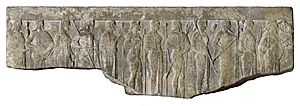Twelve Olympians facts for kids

The Twelve Olympians are the most important gods of Greek mythology, who lived atop Mount Olympus. Seventeen gods have been said to have been Olympians, but there were never more than twelve at the same time.
Zeus, Hera, Poseidon, Ares, Hermes, Hephaestus, Aphrodite, Athena, Apollo, and Artemis are always considered to be Olympians. Hebe, Helios, Hestia, Demeter, Dionysus, Hades, and Persephone are the gods who have sometimes been Olympians. Thus, Hestia gave up her place to Dionysus because she wanted to live amongst humans.
The Olympians became the most important gods when Zeus and his brothers and sisters won a war against the Titans. Zeus, Hera, Poseidon, Demeter, Hestia, and Hades are all brothers and sisters. All the other gods are Zeus's children and have different mothers.
Gods who are Olympians
- Zeus is the most important god. He is the ruler of Mount Olympus and is the god of the weather. "If you were to chain the heavens and attempt to drag me down, with the power of you all, you could not. If I were to attempt to drag you down, it would be an easy matter."
- Poseidon is the god of the oceans. He is the next most important god to Zeus along with Hades.
- Hera is Zeus' wife. She is the goddess of marriage.
- Ares is the god of war and violence.
- Artemis is the goddess of hunting and animals.
- Hephaestus is the god of fire and forging.
- Apollo is the god of light, dance, music, and medicine poems.
- Hermes is the messenger of the gods. He is also the god of travelers, thieves and shepherds.
- Hestia is the goddess of the home and family.
- Demeter is the goddess of the earth, wheat, flowers and plants.
- Aphrodite is the goddess of love and beauty .
- Athena is the goddess of wisdom, the arts, industry, justice and skill.
See also
 In Spanish: Dioses olímpicos para niños
In Spanish: Dioses olímpicos para niños

